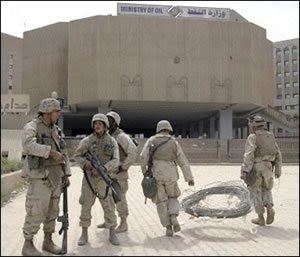 'Iran Given Two-Week Deadline to End the Nuclear Impasse
'Iran Given Two-Week Deadline to End the Nuclear ImpasseSunday 20 July 2008
by: Julian Borger, The Observer
Geneva - Iran was given a fortnight to agree to freeze its uranium enrichment program yesterday or face further international isolation.
After a day of inconclusive talks in Geneva, a six-nation negotiating team warned the Iranian delegation that it had run out of patience and demanded a 'yes or no' answer to a proposal it put forward five weeks ago.
Under that offer, sponsored jointly by the US, Britain, France, Germany, Russia and China, Iran would not expand its uranium enrichment programme, while the international community refrained from imposing further sanctions. This phase would last six weeks, possibly paving the way for suspension of enrichment and more comprehensive talks. The failure to reach agreement appeared likely to trigger new European and UN sanctions and to raise tensions in the Gulf. An Iranian rejection would also represent a rebuff to conciliatory moves from Washington, including the dispatch of a senior diplomat to Geneva to attend high-level talks with the Iranians for the first time in nearly three decades. The diplomat, William Burns, left Geneva without making any public comments.
Javier Solana, the European Union foreign policy chief leading the international negotiating team, said the talks were 'constructive', but admitted: 'We didn't get the answer we were hoping for. I hope very much we will get an answer to our question presented five weeks ago and we hope we will get it in two weeks.'
Solana would not specify what the consequences would be if there was no positive response from Iran in the next fortnight, but Western officials at the talks said there was consensus among the six nations, including Russia and China, that it would be interpreted as a rejection and trigger a new round of UN Security Council sanctions.
'They have been told this is your last meeting. We are not doing this again. Go back to Tehran and you have a week or two at most to give a yes or no,' one official said.
Another Western source involved in the talks said: 'There was some impatience voiced by a number of people at the meeting that we want a clear answer.'
Asked at a press conference, the chief nuclear negotiator for Iran and head of its delegation, Saeed Jalili, ducked a direct opinion on the freeze proposal. 'We have been talking about that for many hours,' Jalili said. 'What is more important is for us to have a constructive approach and bring that approach to the table, so that we can later deal with our shared worries and concerns.'
After a day of inconclusive talks in Geneva, a six-nation negotiating team warned the Iranian delegation that it had run out of patience and demanded a 'yes or no' answer to a proposal it put forward five weeks ago.
Under that offer, sponsored jointly by the US, Britain, France, Germany, Russia and China, Iran would not expand its uranium enrichment programme, while the international community refrained from imposing further sanctions. This phase would last six weeks, possibly paving the way for suspension of enrichment and more comprehensive talks. The failure to reach agreement appeared likely to trigger new European and UN sanctions and to raise tensions in the Gulf. An Iranian rejection would also represent a rebuff to conciliatory moves from Washington, including the dispatch of a senior diplomat to Geneva to attend high-level talks with the Iranians for the first time in nearly three decades. The diplomat, William Burns, left Geneva without making any public comments.
Javier Solana, the European Union foreign policy chief leading the international negotiating team, said the talks were 'constructive', but admitted: 'We didn't get the answer we were hoping for. I hope very much we will get an answer to our question presented five weeks ago and we hope we will get it in two weeks.'
Solana would not specify what the consequences would be if there was no positive response from Iran in the next fortnight, but Western officials at the talks said there was consensus among the six nations, including Russia and China, that it would be interpreted as a rejection and trigger a new round of UN Security Council sanctions.
'They have been told this is your last meeting. We are not doing this again. Go back to Tehran and you have a week or two at most to give a yes or no,' one official said.
Another Western source involved in the talks said: 'There was some impatience voiced by a number of people at the meeting that we want a clear answer.'
Asked at a press conference, the chief nuclear negotiator for Iran and head of its delegation, Saeed Jalili, ducked a direct opinion on the freeze proposal. 'We have been talking about that for many hours,' Jalili said. 'What is more important is for us to have a constructive approach and bring that approach to the table, so that we can later deal with our shared worries and concerns.'



Geen opmerkingen:
Een reactie posten